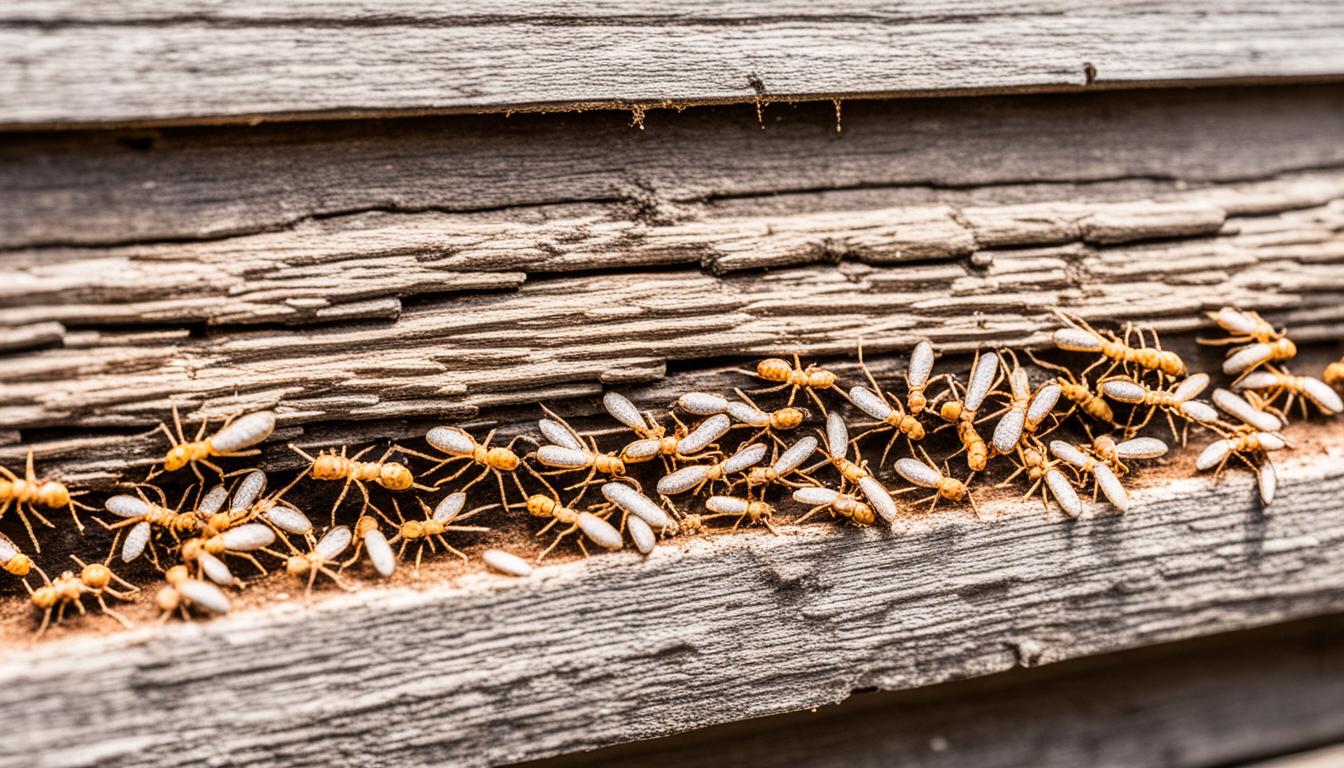When it comes to protecting your home from termite damage, it’s essential to be informed about the actions you should avoid. By understanding what not to do, you can ensure effective pest control and minimize the risk of extensive damage.
Common mistakes when dealing with termites can have severe consequences. That’s why it’s crucial to educate yourself on the do’s and don’ts. In this section, we will provide you with vital information on what actions to avoid when dealing with termites.
Key Takeaways:
- Ignoring termite warning signs can lead to more significant damage over time.
- Avoid using DIY termite control methods, as they are often ineffective.
- Do not disturb termite-infested areas, as it can worsen the infestation.
- Delaying termite treatment and inspection can result in costly repairs.
- Seek professional assistance for the best results in termite control.
Do Not Ignore Early Warning Signs of Termite Infestation
When it comes to termites, early detection is key. Ignoring the early warning signs of a termite infestation can lead to significant damage to your home. To protect your property and prevent further destruction, it’s crucial to be proactive and address these signs promptly.
Here are some early warning signs of termite infestation that you should never ignore:
- Mud tubes: These tunnels made of soil and termite saliva are often found along the foundation of your home or on walls.
- Discarded wings: Swarmers, adult termites ready to mate and establish new colonies, shed their wings once they find a suitable location.
- Wood damage: Termites feed on wooden structures, causing hollowed or damaged wood. Look out for sagging or buckling floors, hollow-sounding timber, or blistered paint.
- Termite droppings: Also known as frass, termite droppings resemble tiny pellets or sawdust. You may find them near wood or in small piles.
By being aware of these early warning signs, you can take immediate action and prevent further termite damage. Don’t hesitate to seek professional assistance if you suspect a termite infestation in your home.
| Early Warning Signs | Location | Description |
|---|---|---|
| Mud tubes | Foundation, walls | Tunnels made of soil and termite saliva |
| Discarded wings | On surfaces | Shed wings from swarmers |
| Wood damage | Floors, timber | Hollowed or damaged wood, sagging or buckling floors |
| Termite droppings (frass) | Near wood | Tiny pellets or sawdust-like piles |
Avoid DIY Termite Control Methods
While it may be tempting to handle termite control on your own, it is generally not recommended. DIY termite control methods often lack the expertise and effectiveness of professional pest control services.
When it comes to termites, it’s important to understand that they are persistent and challenging pests to eliminate. Without the proper knowledge and tools, DIY methods may not provide long-lasting solutions. By attempting DIY termite control, you run the risk of inadequate treatment, allowing the infestation to worsen and cause extensive damage to your home.
Professional pest control services have the expertise and experience to identify the extent of the infestation, locate termite colonies, and effectively eliminate the termites from your premises. They also have access to advanced treatments and techniques that are not commonly available to the general public.
Moreover, pest control professionals can provide ongoing monitoring and maintenance to ensure that termites do not return. They can also offer valuable advice on preventive measures to protect your home from future infestations.
By opting for professional assistance, you can have peace of mind knowing that your termite problem is being handled by experts who are equipped to address the issue effectively and efficiently.
When it comes to the well-being and safety of your home, it’s best to leave termite control to the professionals. Avoid the risks and uncertainties associated with DIY methods and seek professional assistance for a thorough and reliable solution to your termite problems.
Do Not Disturb Termite Infested Areas
When facing a termite infestation, it is crucial to avoid disturbing the areas where termites have taken hold. Disturbing termite-infested areas can worsen the situation and make it more challenging to eliminate the infestation altogether. To effectively address the termite problem and prevent further damage, it’s important not to disrupt the termites, their nests, or the mud tubes they use for transportation.
Disturbing termite-infested areas can result in several negative consequences. Firstly, it can lead to the scattering and spread of termites to other parts of your home, potentially exacerbating the infestation. Secondly, termites may retreat deeper into their nests or hide in previously unnoticed areas, making them harder to locate and eradicate. Lastly, disturbing termite-infested areas can also cause termites to become more agitated, leading them to inflict damage more rapidly.
To prevent inadvertently aggravating the termite problem, follow these guidelines:
- Refrain from disturbing any visible termite nests or mounds.
- Avoid breaking open any mud tubes created by termites for travel.
- Do not attempt to remove or relocate termite-infested wood or debris.
By resisting the temptation to disturb termite-infested areas, you ensure that the proper assessment and eradication methods can be carried out effectively. Remember, seeking professional assistance from certified pest control experts is usually the best approach when dealing with termites.
Avoid Delaying Termite Treatment and Inspection
When it comes to termite control, timely action is crucial. Delaying termite treatment and neglecting regular inspections can result in severe infestations and costly repairs. To protect your home from extensive damage, it is essential to prioritize prompt treatment and regular inspections.
Termites are notorious for their ability to cause significant structural damage over time. Without proper treatment, their colonies can grow exponentially, leading to more extensive infestations that are challenging to eliminate. By addressing termite issues promptly, you can prevent the situation from escalating and mitigate potential damage.
Regular termite inspections are equally important as they help identify any signs of termite activity, even before the damage becomes apparent. Professional inspectors have the expertise and tools to detect termite infestations in their early stages, allowing for targeted treatments and proactive preventive measures.
Don’t let the fear of termites delay necessary treatment and inspections. By taking immediate action, you can save yourself from the headache of dealing with severe infestations and the financial burden of extensive repairs.
The Importance of Prompt Termite Treatment
Effective termite control starts with promptly addressing infestations. Timely treatment helps minimize termite damage and prevents their colonies from spreading further. Treating termite infestations early significantly reduces the likelihood of extensive structural damage, saving you time, money, and unnecessary stress.
When termites are left untreated, they can cause severe harm to the wooden structures of your home, compromising their integrity over time. This can lead to costly repairs and potentially diminish the value of your property.
By taking immediate action and seeking professional help for termite treatment, you can protect your home’s structural integrity, ensuring a safe and secure living environment for you and your family.
The Significance of Regular Termite Inspections
Regular termite inspections are an integral part of effective termite control. These inspections allow professionals to assess the presence of termites and identify potential risks in your property. Early detection of termite activity enables targeted treatment and preventive measures, helping to halt infestations before they become more severe.
During termite inspections, professionals thoroughly examine your property, looking for visible signs of termite infestation, such as mud tubes, damaged wood, discarded wings, and termite droppings. They may also use advanced technologies, such as thermal imaging cameras, to detect hidden termite activity within your home’s structures.
Regular inspections not only detect existing infestations but also help create a barrier against future termite attacks. By implementing preventive measures based on inspection findings, you can safeguard your home from termite damage year-round.
Don’t Delay, Act Today!
To protect your home from the devastating effects of termites, procrastination is not an option. Delaying termite treatment and neglecting regular inspections can lead to severe infestations and costly repairs. By prioritizing prompt action and staying proactive in termite control, you can maintain the longevity of your home and ensure a termite-free environment for years to come.
| Benefits of Timely Treatment and Inspections |
|---|
| Prevents extensive termite damage |
| Minimizes costly repairs |
| Preserves your home’s structural integrity |
| Reduces the likelihood of severe infestations |
| Protects your property’s value |
Conclusion
In conclusion, being informed about the actions to avoid when dealing with termites is essential for protecting your home from damage. By recognizing the early warning signs of termite infestation, such as mud tubes, discarded wings, wood damage, and termite droppings, you can take proactive measures to prevent further destruction.
Avoiding DIY termite control methods is advisable, as they often lack the expertise and effectiveness of professional pest control services. Instead, seek the assistance of professionals who can employ the appropriate treatment methods and ensure long-term termite management.
Additionally, refraining from disturbing termite-infested areas is crucial to prevent aggravating the situation and making it harder to eliminate the infestation. By respecting the termites’ nests and mud tubes, you can minimize the risk of further damage to your property.
Remember to prioritize timely termite treatment and regular inspections. Delaying treatment or neglecting inspections can lead to more severe infestations and costly repairs. By taking prompt action and scheduling regular termite inspections, you can effectively manage and control termite infestations, preserving the integrity of your home.
For the best results and comprehensive termite control, it is recommended to seek professional assistance. Professional pest control services have the knowledge, experience, and tools to handle termite infestations effectively, ensuring the long-term protection of your home from termite damage.
FAQ
What actions should you avoid when dealing with termites?
It is important to avoid certain actions when dealing with termites to protect your home from damage and ensure effective pest control. These actions include ignoring early warning signs, attempting DIY termite control methods, disturbing termite-infested areas, and delaying termite treatment and inspection.
Why should you not ignore the early warning signs of a termite infestation?
Ignoring the early warning signs of a termite infestation can lead to further termite damage. Signs to look out for include mud tubes, discarded wings, wood damage, and termite droppings. By addressing these signs promptly, you can prevent the infestation from worsening.
Why is it not recommended to use DIY termite control methods?
DIY termite control methods lack the expertise and effectiveness of professional pest control services. Termites can be difficult to eliminate, and DIY methods often do not provide long-term solutions. It is best to seek professional assistance for effective termite control.
Why shouldn’t you disturb termite-infested areas?
Disturbing termite-infested areas can aggravate the infestation and make it harder to eliminate. It is important to avoid disturbing the termites, their nests, or mud tubes to prevent further damage to your home. Seek professional guidance on how to handle termite-infested areas without making the situation worse.
Why is delaying termite treatment and inspection a bad idea?
Delaying termite treatment and neglecting regular inspections can result in more severe infestations and costly repairs. Timely treatment and inspections are crucial for preventing extensive termite damage. Take prompt action and schedule regular termite inspections to effectively control and manage termite infestations.










